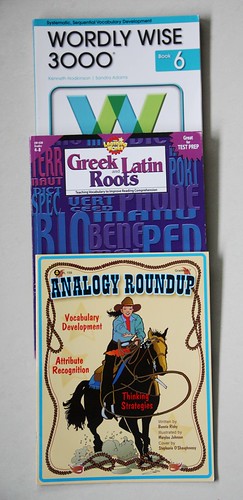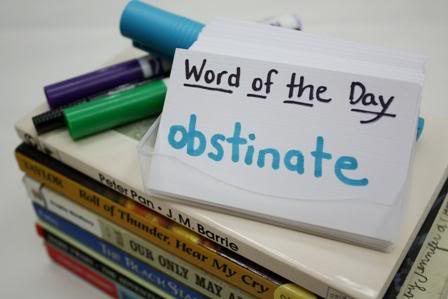I hope that the posts in this 10 Days of Language Arts series are nudging you towards investing more time into the foundation of English and are not giving you stress or feelings of inadequacy. Remember that you can’t do everything every day. You may not even touch on all ten aspects in an entire week. But over the course of a school year, look to see if your language arts is balanced and includes all the areas I’m touching on in this 10 days series.
Vocabulary
The main trick to vocabulary is simply exposure. If you are exposed to a word in context enough times, you will eventually learn both what it means and how to use it yourself.
As a second language learner, I can attest to the power of repeated exposure in context. I mastered Mandarin words not from reading vocabulary lists in my textbooks but from hearing those words in conversation with friends. It’s not that the vocabulary list was useless; it’s just that the context of a real conversation helped me grasp the nuances of connotation and usage which the book didn’t reveal. Further, hearing a word over and over dozens of times makes it familiar and takes away the fear of using a brand new word.
An average student needs to be exposed to a word up to 14 times to be able to use it fluently. (See research for this fact.) Gifted students need fewer times; slower learners need even more than 14. This exposure to a word can come in many ways — hearing it, reading it, writing it, studying it. Your job as homeschool mom is to create that repeated exposure to words. Eventually, they will sink in. Here are ways to expose kids to words.
Workbooks and Curriculum
A teacher’s first thought when faced with the need to teach something is to look for the “perfect” curriculum. I have certainly used my share of vocabulary workbooks, but I don’t think they are the primary way that students master new words.
When I say master new words, I mean being able to use them in context in speaking or writing not merely choosing the definition in a multiple choice question. Workbooks are somewhat artificial and focus mostly on seeing and writing the words.
 Nevertheless, vocabulary workbooks do make a very effective complement to the other methods, so I will make some recommendations.
Nevertheless, vocabulary workbooks do make a very effective complement to the other methods, so I will make some recommendations.
1. Wordly Wise
Wordly Wise is a fantastic series of books that can take children through their entire homeschool career.
2. Greek & Latin Roots
I also strongly recommend some study of Greek and Latin roots. These keys to words unlock meanings and help students do well on standardized tests. Whenever you have a chance to dissect a word’s prefix, root, and suffix, do it.
We have used Greek and Latin Roots, Gr. 4-8. It’s designed for a classroom but is easily adaptable to a homeschool as long as you don’t mind photocopying the pages.
3. Analogies
I’m also a huge fan of analogies for both logic and vocabulary. Have your children create analogies as well as solve them.
I tend to mix up our vocabulary workbook approach, switching from one type to another. Right now we are doing a few weeks of Wordly Wise and then a week of Greek and Latin Roots, Gr. 4-8.
Vocabulary Printables
Vocabulary Graphic Organizers (from Wordly Wise)
Vocabulary Notebooking Pages (from Notebooking Fairy)
Living Books
Books are a wonderful way to be exposed to new words. Authors tend to use certain words over and over, so there is even more chance for repetition as you work through a novel.
If your child is reading the book, he sees the word’s spelling and can possibly identify roots, prefixes, and suffixes. The context offers clues for meaning.
If you are reading the book aloud, the child doesn’t see the spelling but can hear the pronunciation of the word. Further, your intonation may offer even more context to the meaning.
Both ways have advantages, so use both!
TIP: There are difficult books that children can’t understand on their own yet but that they can comprehend when read aloud by proficient readers. So reading aloud offers exposure to much more advanced vocabulary than your child would hear on his own as long as you are choosing to read aloud slightly difficult books.
Conversations and Listening
Don’t think that learning vocabulary comes only from printed sources. Children with the most advanced vocabularies come from families with educated parents who talk to them frequently, using more advanced words. The auditory and relational component is critical here, so talk to your children. Don’t “dumb down” your vocabulary. Use words even if you think your children don’t know them. In fact, those are exactly the words you should use. After using those words time and time again, your child will either ask the meaning or infer it from context.
Along the same lines, expose your children to great speakers and preachers who use advanced vocabulary correctly.


I cannot wait to get my hands on your ebook! great posts on Language Arts- I’ve got to scroll through and catch up- stupendous! 🙂
I am so excited to hear you are putting together an e-book for this series! I have thought many times how I wish I could just print this stuff off and stick it in my binder. I can’t wait to purchase your e-book!
Yeah for the ebook!!! I have been LOVING this series….and so thankful for the time you have invested in it!
Jimmie, I love your blog! Thank you so much for these LA posts. Have you ever heard of Vocabulary Cartoons? http://www.vocabularycartoons.com/home/
Just thought I’d share!